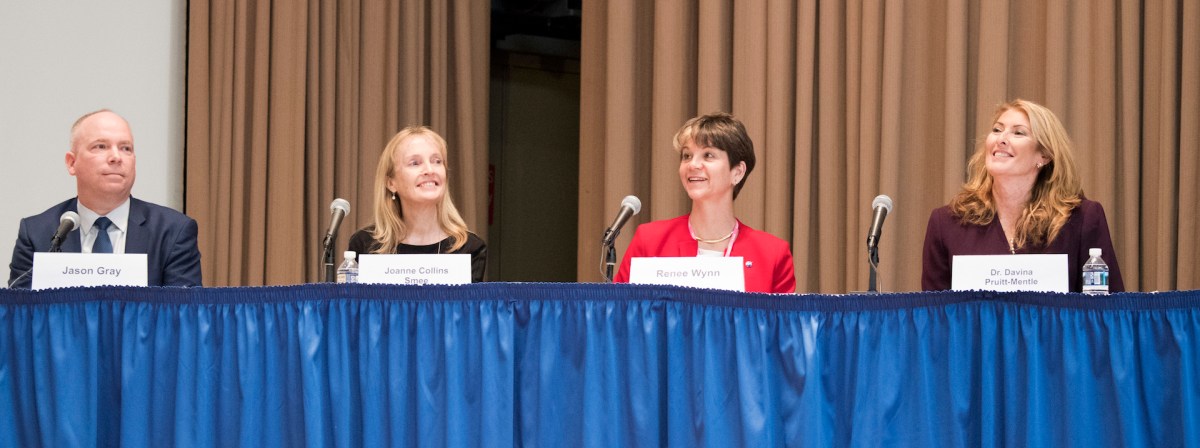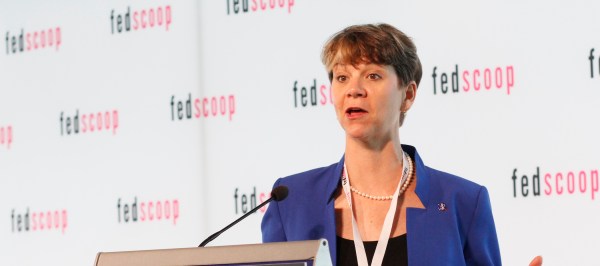Top women in federal IT share inspiration, life advice at CIO Council event

Be intellectually curious, find a mentor and don’t be afraid to take an unconventional route — these are among the pieces of wisdom some top women in federal IT shared on stage at the CIO Council’s inaugural Women in Federal IT and Cyber event Thursday morning.
The event, scheduled during National Women’s History Month, was billed as a celebration of the “successes of women thriving in today’s federal IT enterprise,” as well as a way to discuss strategies for encouraging more young women into the federal IT workforce. Panels were focused around “cultivating IT interest in our young women,” leadership lessons learned and the recognition of recent career achievements.
But almost all discussion started from a simple, personal question: “How’d you get here?”
Women shared stories of what, often from a young age, encouraged their love of science and technology as well as what drew them to the federal government. Joann Collins-Smee, the new executive director of the Centers of Excellence initiative at the General Services Administration, said her love for technology goes “way back to my childhood.”
Collins-Smee grew up one of four sisters — “We were brought up that you could do anything because we could do anything,” she said. It wasn’t until high school that she first encountered a divide between boys and girls in terms of the classes offered. The boys, she remembered, could take physics. “I was just bedamned if they could do something the girls couldn’t do,” Collins-Smee said. “So I started a little rebellion and I got in the physics class. And I did not do well in the physics class,” she added, to laughter in the room. It all worked out, though, and her love of technology started then and there.
But the experience taught her something else as well — she realized that “there are a lot of smart women who are being left behind because they’re not as obnoxious as me,” she said.
A kind of “Annie Get Your Gun“-style cheerleading underpinned much of the day’s discussions, but each woman had a pretty distinct career path.
For Sylvia Burns, CIO at the Department of the Interior, it was “Star Trek,” and the show’s imaginative depiction of the future, that initially interested her in technology. Margie Graves, U.S. Deputy CIO, started off in science and engineering, and 9/11 was her catalyst in joining the federal government. Small Business Administration CIO Maria Roat, meanwhile, joined the Navy directly after high school as a way to move on from a small-town upbringing.
Taking on unforeseen roles and challenges stood out as a decisive piece of most of the women’s stories.
Beth Killoran, CIO at the Department of Health and Human Services, recounted how these moments shaped her journey. There have been many times, she said, when she felt like “oh my god, I’m not quite sure I’m ready to do that,” Killoran said. But she was told, she recalled, “‘no, no, no, just try it for six months, it’s fine.’ And I never went back, ever, to the job that I actually had. And because of that, there were different opportunities and skills that I learned and all of them led to the path that I’m on now.”
Mia Jordan, CIO and the U.S. Department of Agriculture’s Rural Development Agency, called IT a “stretch career” — one where she’s constantly challenging herself. And she likes that, Jordan added.
“You have to be constantly intellectually curious,” Collins-Smee said during her panel.
The event also took the time to contend with some of the more difficult questions of life and work. Namely, how do you balance both?
It’s a challenging reality, the women acknowledged. “It comes down to you have to make choices,” Burns said. “And it’s based on your values. And you make sacrifices for those values.”
Especially if one wishes to have a family, Burns went on, this can require taking a step back sometimes.
But unplugging from time to time isn’t just for the benefit of children or a spouse, Graves said. It’s actually good for your work too. “Some of your best ideas come… when you refresh yourself,” she said.
Relationships are support systems, too, something several women identified as being important. It’s good to find mentors, they said, and cheerleaders. “You have to have people around you that believe you can so that days you don’t think you can, when you’re faking it, you’re like ‘I’m a fraud standing here’, you’ve got to have someone that just kind of pushes you on the backside,” Renee Wynn, CIO at NASA, said.
“These are important discussions and dialogs,” U.S. CIO Suzette Kent said in her closing remarks. “The panelists were bold in sharing their stories, so I hope that you found something that motivated you or was inspirational.”
“Continue to be bold, continue to be curious,” Kent said.
The CIO Council event coincided FedScoop’s launch of the 2018 Top Women in Tech list. Many of the event’s speakers were honored on this year’s list.




